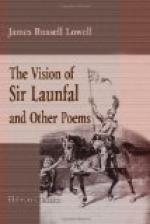Among the Nations bright beyond compare?
What were our lives without thee? 350
What all our lives to save thee?
We reck not what we gave thee;
We will not dare to doubt thee,
But ask whatever else, and we will dare!
NOTES
THE VISION OF SIR LAUNFAL
1. The Musing organist: There is a peculiar felicity in this musical introduction. The poem is like an improvisation, and was indeed composed much as a musician improvises, with swift grasp of the subtle suggestions of musical tones. It is a dream, an elaborate and somewhat tangled metaphor, full of hidden meaning for the accordant mind, and the poet appropriately gives it a setting of music, the most symbolic of all the arts. It is an allegory, like any one of the adventures in the Fairie Queen, and from the very beginning the reader must be alive to the symbolic meaning, upon which Lowell, unlike Spenser, places chief emphasis, rather than upon the narrative. Compare the similar musical device in Browning’s Abt Vogler and Adelaide Proctor’s Lost Chord.
6. Theme: The theme, subject, or underlying thought of the poem is expressed in line 12 below:
“We Sinais climb and know it not;”
or more comprehensively in the group of four lines of which this is the conclusion. The organist’s fingers wander listlessly over the keys at first; then come forms and figures from out of dreamland over the bridge of his careless melody, and gradually the vision takes consistent and expressive shape. So the poet comes upon his central subject, or theme, shaped from his wandering thought and imagination.
7. Auroral flushes: Like the first faint glimmerings of light in the East that point out the pathway of the rising sun, the uncertain, wavering outlines of the poet’s vision precede the perfected theme that is drawing near.
9. Not only around our infancy, etc.: The allusion is to Wordsworth’s Ode on the Intimations of Immortality, especially these lines:
“Heaven lies about us
in our infancy!
Shades of the prison-house
begin to close
Upon
the growing Boy,
But he beholds the light,
and whence it flows,
He
sees it in his joy;
The Youth, who daily farther
from the east
Must
travel, still is Nature’s Priest,
And
by the vision splendid
Is
on his way attended;
At length the Man perceives
it die away,
And fade into the light of
common day.”
As Lowell’s central theme is so intimately associated with that of Wordsworth’s poem, if not directly suggested by it, the two poems should be read together and compared. Lowell maintains that “heaven lies about us” not only in our infancy, but at all times, if only we have the soul to comprehend it.




